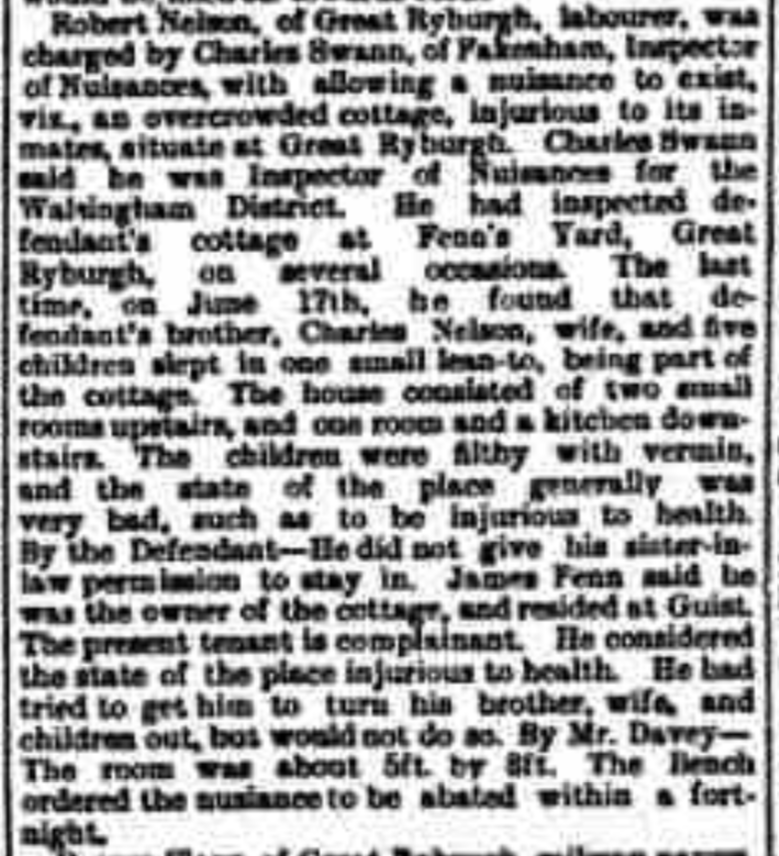Part 8
Adding fuel to the fire. 1886
1886 started quietly in the press for Morris Fuller with his reported year beginning with two Vestry Meetings.
The first at Little Ryburgh found in Norfolk News on 20th. March :
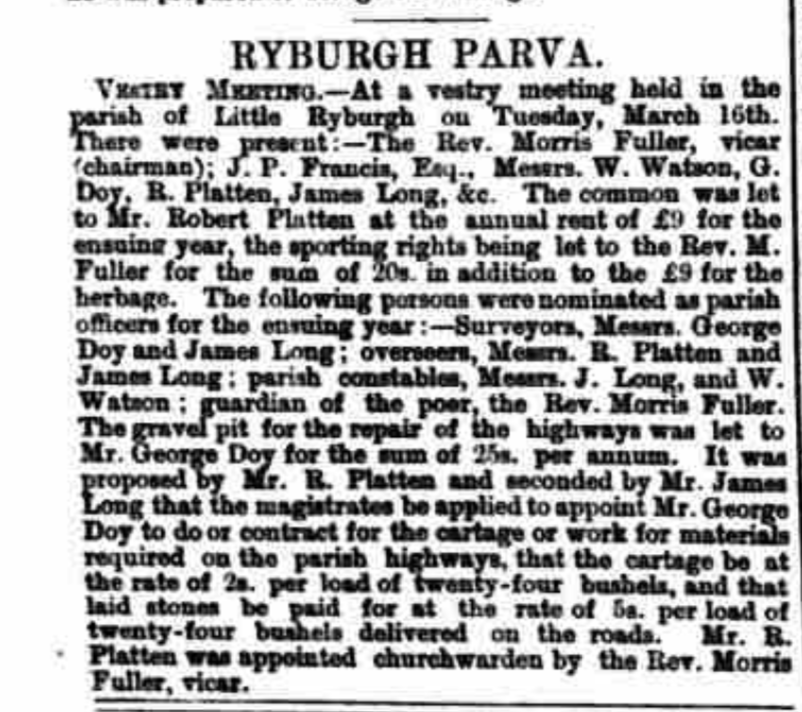
and again in May with a write up of the Great Ryburgh Easter Vestry Meeting in the Norfolk Chronicle:
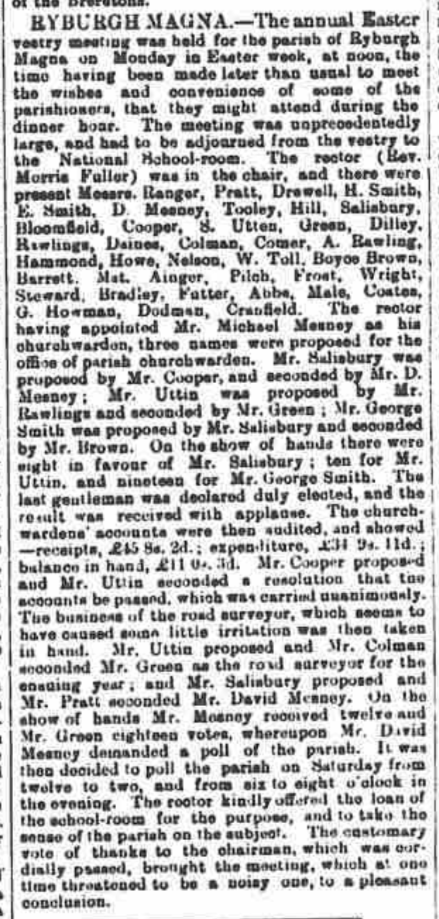
It seems to be the case that it is only from press cuttings such as these that we have any information of Vestry activities prior to 1890 when a new minute book was started. This is thanks to the Revd, Henry Fowler Baker the Rector succeeding Morris and was necessitated because nearly all such documentation had been lost during his Incumbency.
***********
Morris attended the Norwich Diocesan Conference in May where the topic of the Reform of Convocation was under discussion. He manages to edge in to the press report in the Norfolk Chronicle on May 8th. after proposing an ammendment that wasn’t wholly adopted with any enthusiasm:
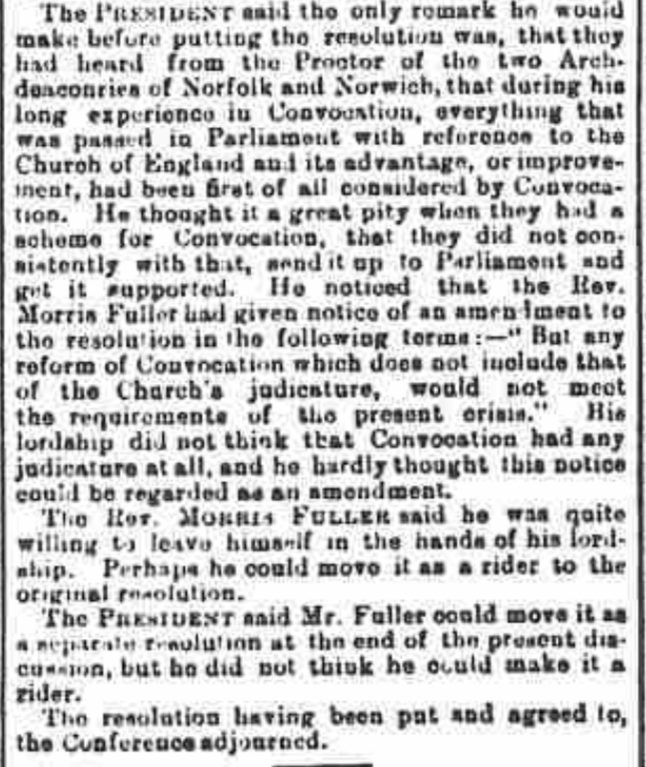
In the same month he had a couple of polite reviews of his “Fuller History”, this one from the Pall Mall Gazette on 2th May;
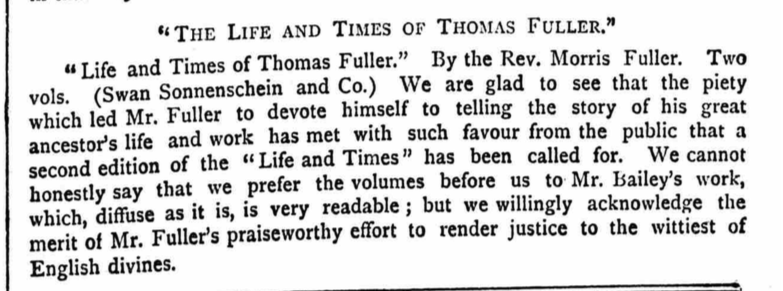
It is also noted, I think for the first time, that Morris wasn’t “all work and no play” as he had some interest in promoting “Theatre” in Ryburgh, as seen in this notice in the Lynn Advertiser on 31st. July 1886. The play is a collaboration of two prominent Victorian literary men, Norwich born John Palgrave Simpson and Herman Charles Merivale. It was first produced at the Royal Court Theatre on 25th October 1873:
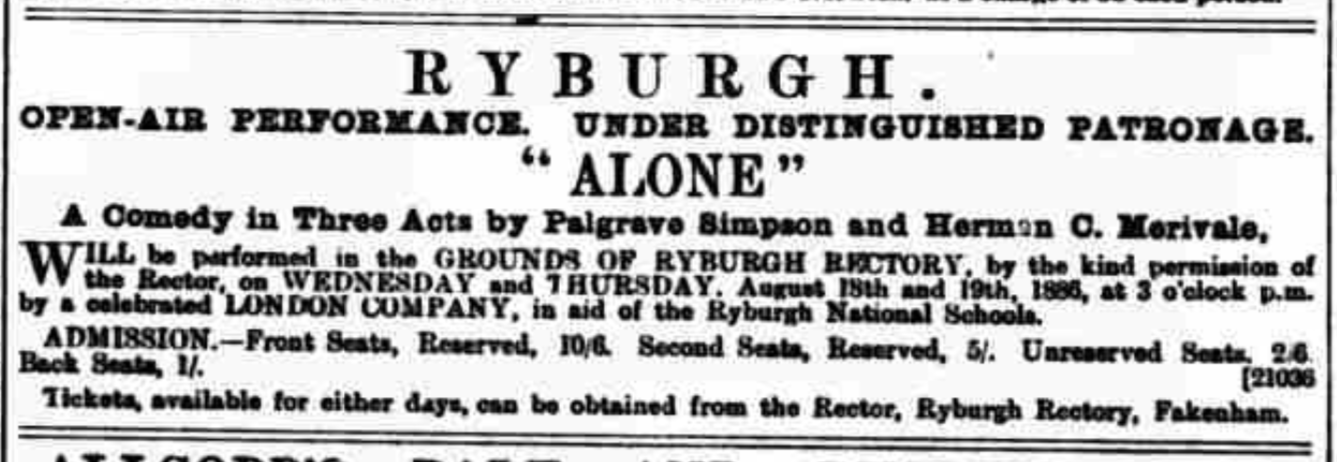
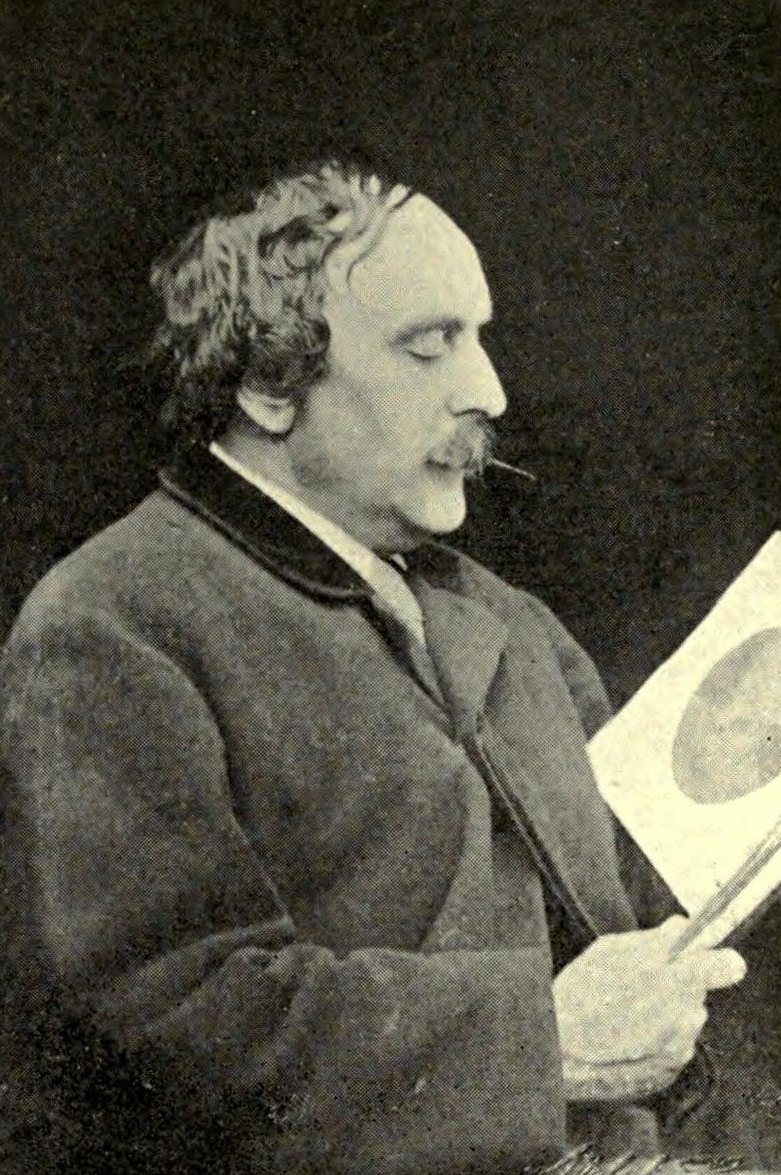
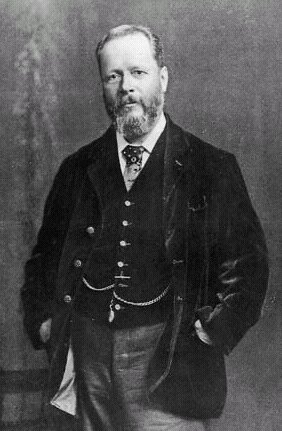
Priced at one shilling for the cheapest seats up to 10/-6d.for the reserved front row, the performances were hardly aimed at the parishioner in the street. Exactly who the “Celebrated London Company” were that gave the performances and how well it was received is not known.
In his “History of English Drama”, Allardyce Nicholl has the following to say about this play in particular:
All of the characters (In the plays of this period) are stock types; of this a note to the list of dramatis personae in ALONE is characteristic. Of Stratton Stawless in this play Simpson observes that “the part does not belong to the line of the ‘Old Man’ but of the ‘Eccentric Comedian’” His figures thus have a marked sameness, and this sameness intrudes into the plots as well. In ALONE it is Colonel Challice , not the heroine who is blind. Cruelly, this gentleman has thrown off his daughter years before, but she returns and reads LEAR to him so prettily that he relents and takes her once more to his heart.
************
Joseph Arch’s loss of the North West Norfolk Constituency and the return of Lord Henry Bentinck to Parliament seems to have once again polarised opinion in the locality and this trivial incident was reported here in the Norwich Mercury on July 26th 1886:
George Slegg, of Great Ryburgh, railway navvy, was charged with assaulting Edward Carr, of Fakenham, chemist, on the 12th inst. Complainant said he was a chemist. About ten o’clock on the evening of Monday 12th July, he was in the Bell Inn. There were several people there talking about Arch’s return. Some people in Stibbard and Ryburgh had a spleen against him, as he took a prominent part in politics. He told those present “ It was a good job Arch was turned out, as master and man would get on better,” and some chaff took place. Mrs Richardson the landlady, then accused him of organising a party to throw rotten eggs at Arch. he went round the bar to assure her he did not know anything about it till that morning when defendant said he would shake him. Complainant said-“I don’t think you are a man of that sort, I’ll see if you will.” The two bar doors are near each other. Complainant went out of one , and the defendant came out of the other and struck him twice with his fist in the face. By Defendant - He did not say anything to him: but he did to his friend, who was eating a piece of meat, when complainant said, “It was a piece of old Arch’s sow’s ear.” He also said something to defendant’s friend about Jesse Collings; but it was simply said in chaff. Defendant, in defence said complainant came and asked him to do it and he did it. The Bench fined the defendant 1s., and 1s. towards costs.
On the other hand,it gave impetus to the local Primrose League supporters and on Saturday 14th August the proceedings of the following meeting at Fakenham were reported in the Lynn Advertiser:
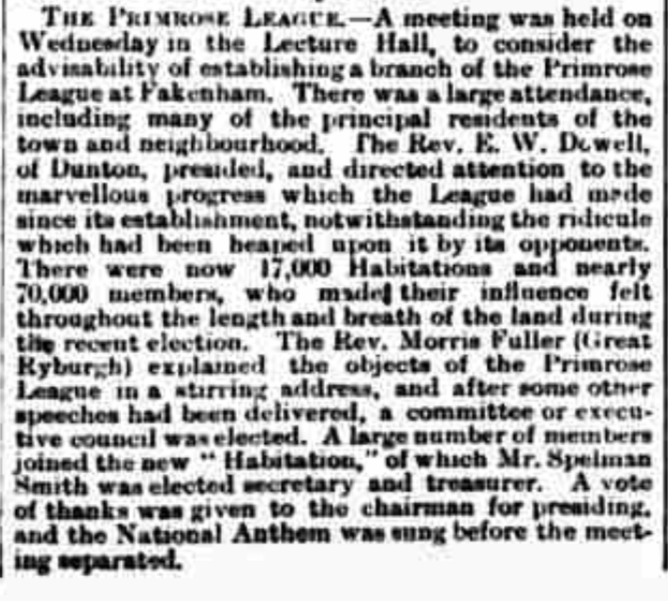
and the Norwich Mercury amongst others:
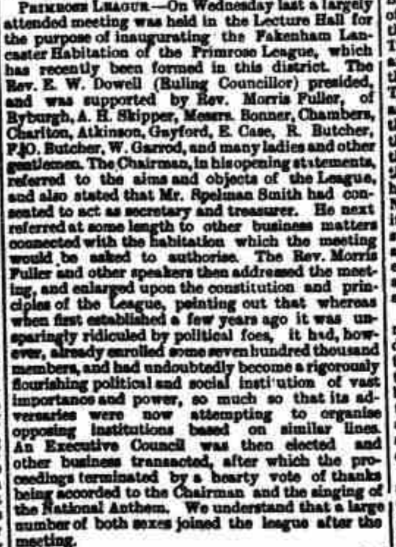
As everything in the garden was apparently returning to the status quo, Morris found time to write travelogues of his favourite Norfolk coastal haunts for “London Society“. He had already contributed one such on Cromer when his lengthy appreciation of the North Coast appeared in June followed by one on Hunstanton in August.
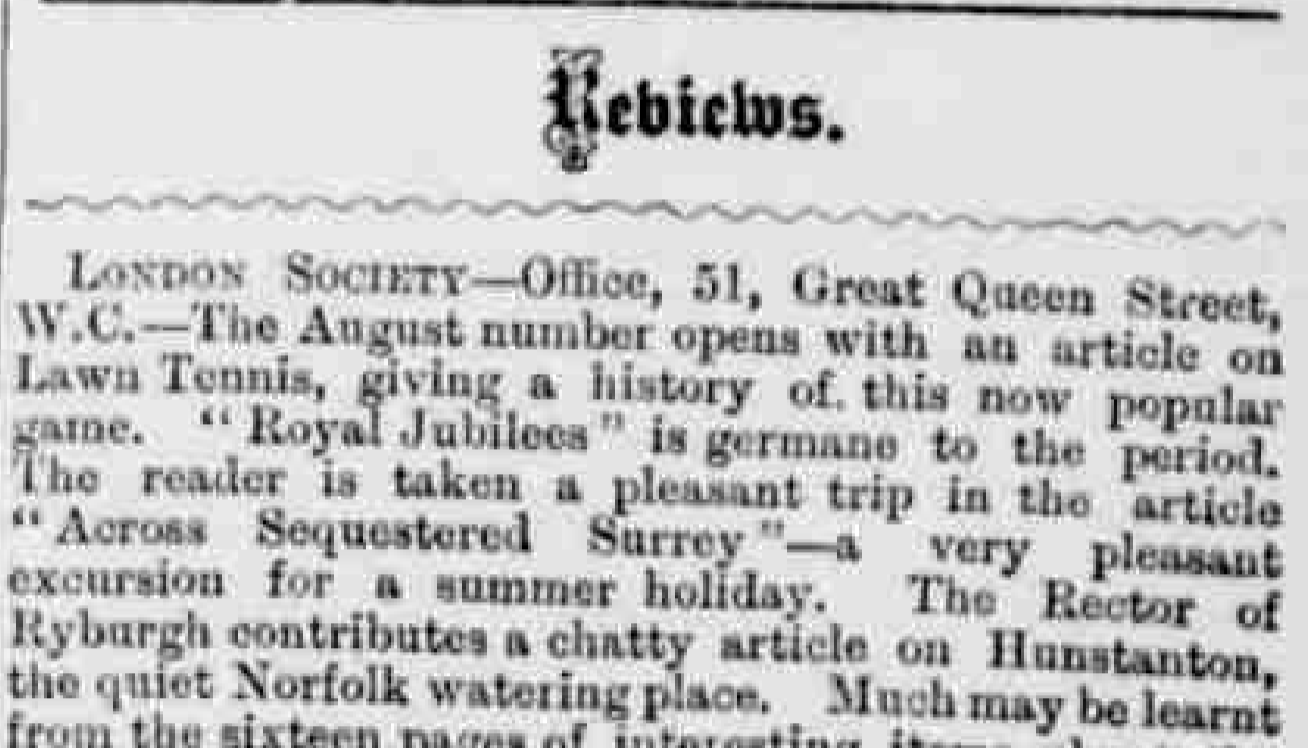
In October he was able to look over the review of “Our Lady of Walsingham” his latest modest article published in this popular periodical:
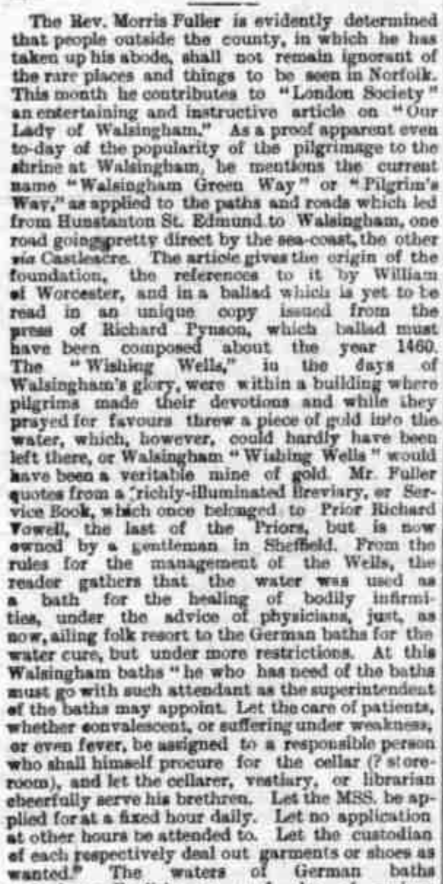
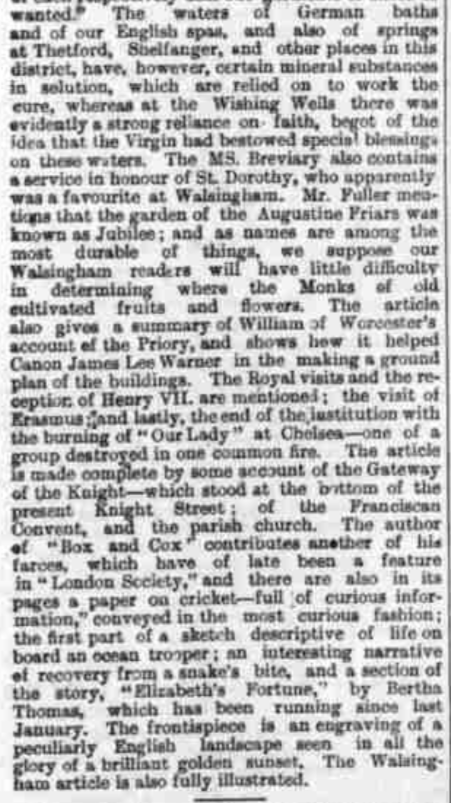
November brought about the Norwich Diocesan Conference and the opportunity to re-launch his hobby-horse from the Convocation in May. The reports here come from the Ipswich Journal of November 2nd:

and having upset the Liberal electorate the previous year, he then stirred-up inter-denominational controversy with his following proposal:

The Diss Express carried a report of the proceedings on November 12th:
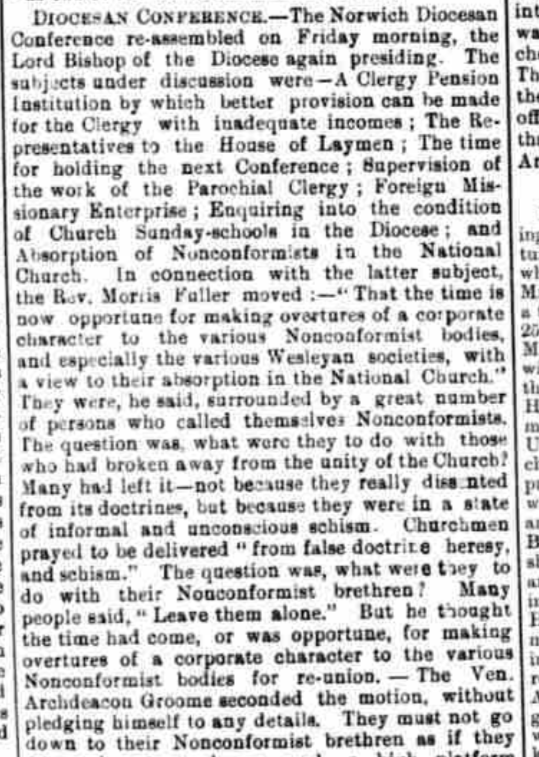
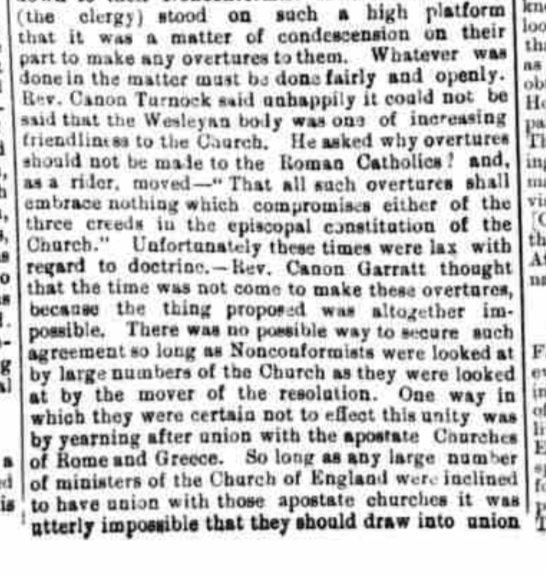
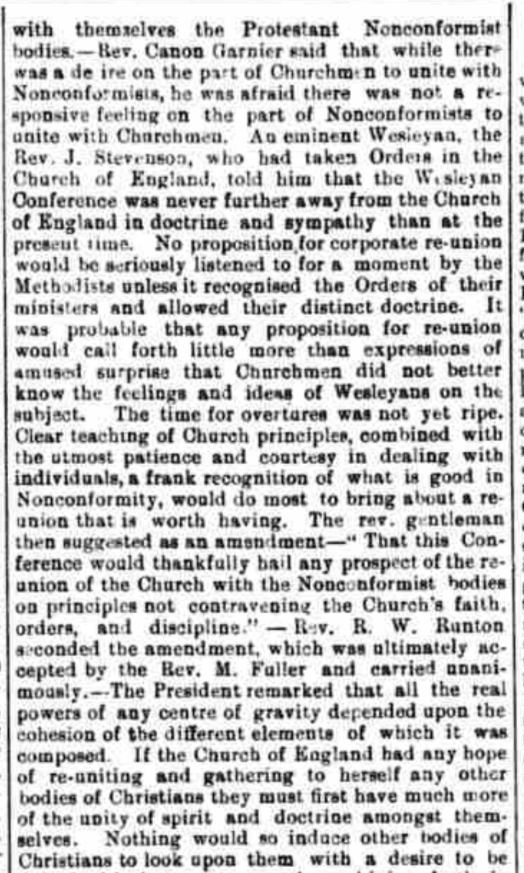
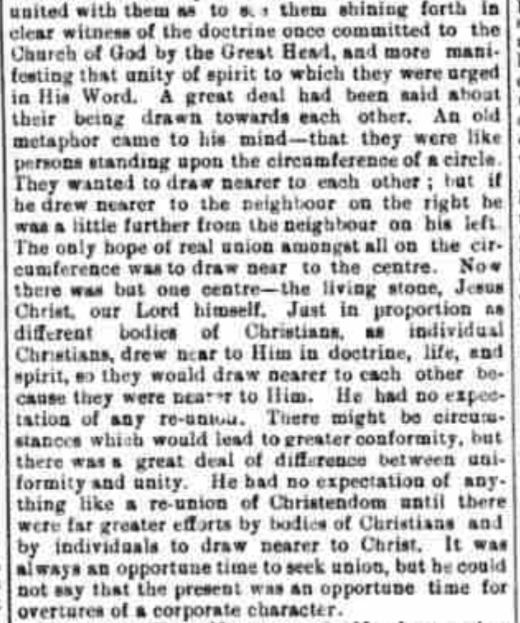
This quite naturally elicited some informed response on the 11th November preceded by an editorial piece on 6th November in the Eastern Evening News:
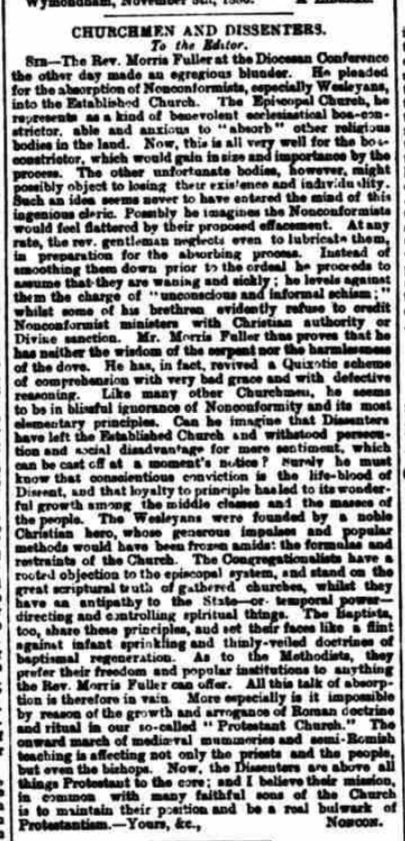
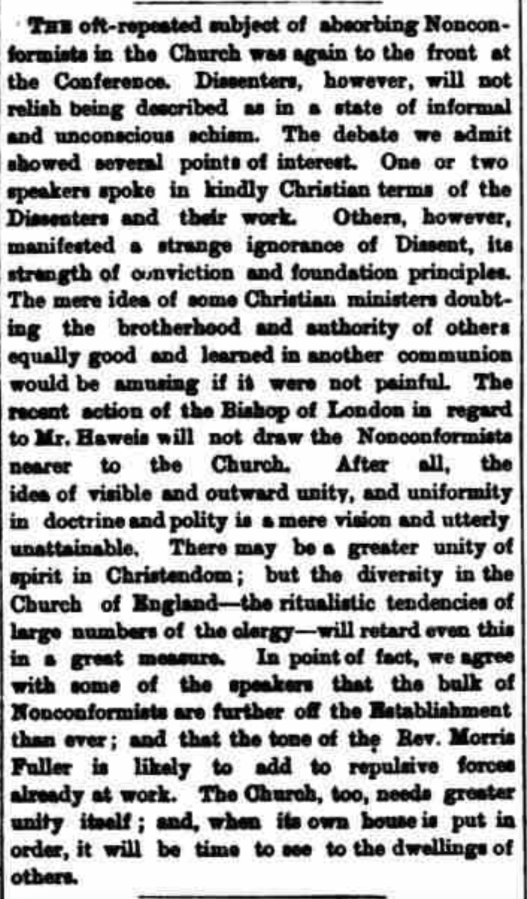
Norfolk Chronicle November 20th. 1886
To the Editor
SIR,- I should like, with your permission, to make a few remarks upon a statement or two made by Canon Garratt at the Diocesan Conference. I certainly should have done so at the time, but I was obliged to leave the Conference Hall in order to catch my train, just as he had finished speaking and while Mt Garnier was moving his amendment.
In speaking in support of the motion moved by Mr Morris Fuller, “That the time is now opportune for making overtures of a corporate chatacter to the various Nonconformist bodies, and especially the various Weslyan societies , with a view of their absorbtion into the National Church.” Canon Garratt stated as his opinion that “Nonconformist ministers were as much ministers of Christ as the clergy.” I must say I never was more astonished in my life at anything I ever heard fall from the lips of any clergyman respecting the Church than I was at these statemants. If Dissenters or Nonconformists are not “schismatics,” pray what are they? I am not aware that they themselves have any objection to be considered as such. As, however, Canon Garratt did not tell us what they were at the Conference, perhaps he will do so in your columns. There are now, as there always have been, and as there will always continue to be to the end of the world- three orders of the ministry in God’s Church, and three only, viz., Bishops, Priests , and Deacons. And if “Nonconformist ministers are as much the ministers of Christ as the clergy” to which of those orders would Canon Garratt have us believe they belong? And as to Wesleyan preachers, what does John Wesley himself say of them? He says he appointed them “wholly and soley to preach, and not to administer sacraments”and “those who imagine these offices” -i.e. the offices of preacher and priest- “to be the same, are totally ignorant of the constitution of the whole Jewish as well as the Christian Church”And again he says, “I never appointed you (the preachers) to the priestly office, such a design never entered my mind, it was furthest from my thoughts, and if any preacher had taken such a step he should have looked on it as a palpable breach of the rule and consequently a recantation of the connexion” and further on another occasion he wrote that his preachers “no more look upon themselves to be priests than to kings” and in his famous “Korah sermon” as it is sometimes called, he states that if they -the peachers- were to attempt to invade the office of the priesthood they would be guilty of the sin of Korah, Dathan and Abiram. No! whatever people may think or try to make themselves believe, the fact still remains, that they and they only , are the true ministers of Christ who have rev=ceived their authority by ordination in the one unbroken line of succession from Christ and His apostles. For whatever we may think of it, God only conveys His grace and authority through His own appointed channels. And as to the words of the motion of Mr Fuller “ That the time is now opportune,&”. That the time is “now” always has been and always will be “opportune” for receiving into the Church the wanderers from her fold, whether they be Methodists, ??????? or Mahommadans B??????? or Buddhist, Congregationalists or Confucian, or indeed any of the others of the hundreds of sects now in existence, but it will be only on the terms laid down by Christ Himself,viz., “Repent and be baptised and wash away your sins. Yours &c.,
R MARTIN
Waterloo House Watton 16th November 1886
**************
Whist in comparison to some of Morris' life, this was a relatively peaceful year, nevertheless, he was most certainly adding fuel to the fire of future events. In our two villages there was a strong Methodist presence that supported 3 different Chapels.
As the years get ever closer to the events of the “Scandal” It was interesting to find in the Norwich Mercury on July 26th 1886 a situation that Mrs Helen Fuller should not have failed to be aware of, though it suggests grinding poverty rather than immorality:
